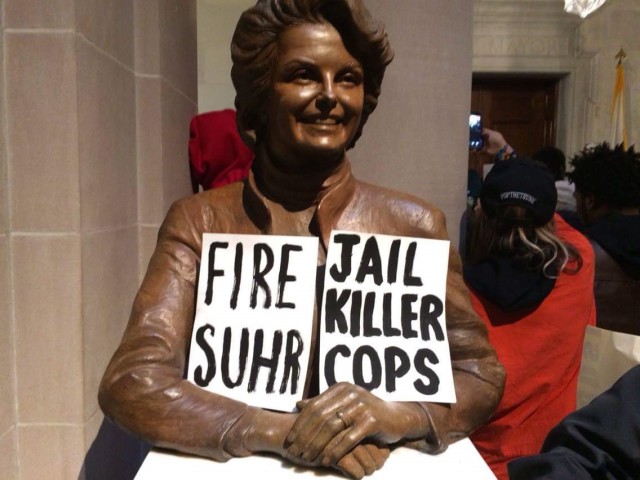
By Tony Robles
DECEMBER 29, 2015 — I am Filipino and black, I am black and Filipino. My blood is rooted in the Fillmore and Bayview. Black lives matter, black homes matter, black voices matter, black love matters, black hearts matter—yet if you are black in San Francisco, you are keenly aware that your life does not matter—that your history is in a perpetual state of being erased from the city landscape.
I was one of many thousands of people who witnessed the murder of Mario Woods by San Francisco Police on the streets of the Bayview. Through cellphone footage, we witnessed another young brother taken down, killed as if it were predestined or an absolute necessity.
Perhaps the killing of Mario Woods and countless other people of color by police is a need, a craving, an addiction to uphold white supremacy and its inherent disgust, disregard, devaluation, and disdain for poor black and brown people in a violent manifest destiny over the domain of our bodies. One need not be a so-called expert on such matters—one need not have a degree or qualification in sociology, criminal justice or other profession whose title ends in “ology.” One needs only a portal of sensitivity and insight to prevail over the culture of hatred and brutality we find ourselves steeped in in San Francisco.
I was among hundreds of outraged San Franciscans who gathered in front of city hall on Christmas even to call for the firing of Police Chief Greg Suhr for the actions of his officers that resulted in the death of Mario Woods. One by one, people spoke out on the shooting of Woods—execution style—expressing outrage at the justification offered by Suhr that his officers were threatened, prompting them to open fire on Woods. The cellphone footage clearly shows Woods walking slumped along the side of a building—at a distance from the officers—whose guns were drawn and aimed at him.
A young African American man spoke, saying he was “Tired of being treated like an animal,” and described the ongoing harassment he has endured at the hands of the Oakland Police Department for a crime he had nothing to do with. As more people spoke of their experiences with law enforcement while being black, I felt the spirits of those who have been violated, those voices omitted from police reports that never had a chance to speak, their pain and voices breaking through the clouds hovering above city hall and invoking the words of the poet Marvin White: Being black and dead means your death calls all black deaths into question. Being black and dead means you cannot rest in peace until the living hears the dead calling for justice and learns the names of the unnamed dead.
An elder from the Longshore Workers’ union reminded us of the insidious origin of the police, that its progenitor was the institution of slavery—that the police evolved from slave catchers who were entrusted with the duty of returning slaves whose only crime was the quest for freedom.
A young sister from the Bayview urged the community to “unshackle your minds, and do not believe the police narrative that is filled with mistruths, cover ups and outright intimidation across the country.” A brother representing the faith community decried the lack of leadership by Mayor Ed Lee in addressing the killing of Woods, asserting that SF could have—in light of police killings that have already transpired in the city, not to mention across the country—introduced reforms to address the issue of police killings of people of color that would send a message that black lives and brown lives matter.
The crowd chanted “No Suhr, No Sir!” in calling for the firing of the chief. Other speakers, including Mission activist Roberto Hernandez, drew the connection between black and brown victims of police violence, citing that the killing of Alex Nieto and Amilcar Perez Lopez by police is inextricably linked to gentrification, displacement of communities of color and the widening economic inequality that plagues the city.
The issue of racist text messages was brought up and a judge’s ruling that no disciplinary action would be taken against the officers involved. The texts made vile and disparaging references to Blacks, Latinos and Filipinos—referring to Filipinos as “Those dirty flips.”
The bullying by the Police Officers Association was addressed. The president of the union sent a harshly toned letter chiding Supervisor Malia Cohen for questioning the actions of the department and calling for accountability. The letter—that has been widely circulated in the community—accused Cohen of being disrespectful of the men and women who wear the uniform.
Is that right? What about the respect for the black community that wears its story, its history, its pain in its skin, a story and history that includes economic and police violence that one cannot remove as if extricating oneself from a blue uniform? Black officers of the SFPD who were present at the rally denounced the letter, indicating that the POA does not represent them or their concerns.
The rally ended with a march inside City Hall to the mayor’s office. The crowd filed through the door and past the sheriff’s deputies, up the stairs to Mayor Lee’s office—that was absent of the mayor himself. One of the deputies, an African American man, was visibly uncomfortable in midst of the procession. More speakers spoke and vowed to keep fighting for the removal of Chief Suhr and for accountability in the police department.
As I stood in solidarity, I recalled a march I took part in with tenants and housing activists to Mayor Lee’s house to demand that he devote more resources to keep people—particularly the black community—in their homes and not fall prey to rampant evictions and real estate speculation.
The mayor wasn’t there on that day either.






